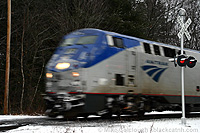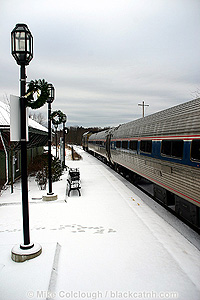|
Reflections All Aboard! text and photos copyright © 2006 by Mike Colclough, all rights reserved. January 16, 2006
Dover, N.H. - Yesterday I decided to shoot a few train pictures for the first time since I was a kid with my dad's Polaroid instant camera. At Dover Station I met the train host, a gray-haired man with a cane who arrived a few minutes before Amtrak's 1:35 "Downeaster" to Portland, Maine. He answered questions and escorted passengers to the platform for boarding, then walked away after the train's departure. He and the conductor greeted each other by first name and smiled. It was good to hear such friendliness in this fast-paced era. It was refreshing to see a sharply-dressed conductor smiling and welcoming. Although I'm a child of the 80s and this era is the only one I've known, I've noticed things seem to be mass-produced without quality, service sloppy and impersonal, and relationships as disposable as the wrappers from the processed food we eat. Focused on numbers, we've become reduced to just numbers. I haven't lived through previous eras, but I've seen decades-old appliances that still work fine. I've heard stories from wrinkled faces that once witnessed simpler, friendlier times when quality meant more than quantity. And I'm glad to see the return of passenger trains to corridors that haven't had them since those simpler, friendlier times. Don't read me wrong; I love cars, and taking long road trips. I'm happy adding accessories to my car and giving rides to friends. But cars are nothing more than an extension of "self." They make it easy for each driver to focus on his or her own mission and become angered by all who get in the way. The other drivers could be the nicest people on earth, but on the road, they're just other cars. In the way. Numbers. On the rails, people can come together. Even if they choose not to meet each other and talk, they can still look over at a fellow passenger often enough to see that he or she is a real human, with real happiness, sadness, triumphs, and struggles. Outside the train, in the passing fields and among the streets of towns, why do photographers position themselves for pictures of it coming around the bend? They don't seem to offer highways the same attention. The Dover train host told me that I wasn't the first professional photographer he's seen come to the station for a photo-op.
He said my kind comes all the time. Sometimes they set up their cameras within view of the tracks in the countryside, on overpasses looking down on sidings along the main lines, and on the shores of rivers with railroad trestles. But why trains? Why does a child set up a model railroad, but hardly ever a "model highway?" Why do we love pictures of trains plowing thier ways through snowstorms, but grimace at photos of cars in the same setting? We may romanticize a photo of a railway locomotive hauling its cars through a mountain blizzard, but feel stress when we see an image of a traffic jam in a similar scene. From birth, people are drawn to something greater. Cars are just an extension of ourselves, our desires, weaknesses, and personalities. In them we can be bigger or smaller than in real life. We can look rich or poor, sporty or practical, but regardless, one person's car remains just one vehicle, just one mission, just one number that hides who we really are. On the train, individuals join missions on a single trip and mingle their personalities. Their weaknesses meet strengths for something that moves faster, shakes the ground, and is not concerned about a little snow on the rails. Signals at crossings warn the cars to stay back: The train won't yield for any of them. We are tempted and yet repelled at the same time upon the hearing of the words, "All aboard!" By instinct we want to meet others, become more than a number among them, and make an ally of the greater, more powerful thing. First, we must willingly let go of "self."
|

